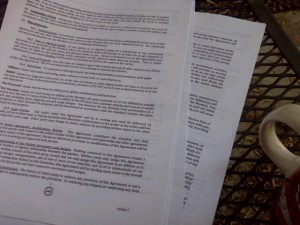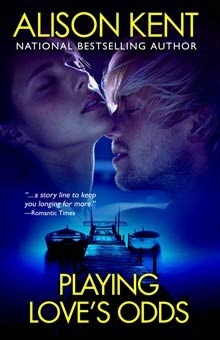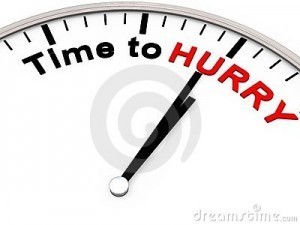Alison Kent's Blog, page 7
April 20, 2012
R is for Repetition
The wind was brittle, bitterly cold. She sat on the park bench, waiting, the wool of her coat and pants no match for the cold seeping up from the cement. Her toes were frosty, her fingertips near to frozen, her breath formed a cloud when she exhaled into the cold air.
Yes, I wrote that. Just now. With very little thought. Yet if I saw that same paragraph in a book I would grumble. If I saw it in one of my own finished works, I would weep (and I have, because no matter how many editing passes, bits of bad writing always slip through)! Why? Because of the overuse of the word cold in that one single paragraph. It’s unnecessary and smacks of inattention. I once read a paragraph on the first page of a book that described  a character’s short white skirt three times. Again. Unnecessary. We got that it’s short and white the first time, just like we got that it’s cold outside up above in the first line. This is, for me, what comes out in my first draft. When revising, I’ll roll my eyes when I run across passages such as this. I was in the moment while writing. I was feeling the cold. I wasn’t thinking about word choice as much as sensation. The words frigid, frosty, chilly, or icy were out of reach. During revisions, however, I will rewrite and rework to keep the above from happening. And, yes, this sort of repetition is totally different than words or phrases repeated purposefully for rhythm or emphasis. The above is just lazy writing. It’s so so SO easy to make different word choices, to give a different feeling to the snippet with an evocative selection of descriptive words.
a character’s short white skirt three times. Again. Unnecessary. We got that it’s short and white the first time, just like we got that it’s cold outside up above in the first line. This is, for me, what comes out in my first draft. When revising, I’ll roll my eyes when I run across passages such as this. I was in the moment while writing. I was feeling the cold. I wasn’t thinking about word choice as much as sensation. The words frigid, frosty, chilly, or icy were out of reach. During revisions, however, I will rewrite and rework to keep the above from happening. And, yes, this sort of repetition is totally different than words or phrases repeated purposefully for rhythm or emphasis. The above is just lazy writing. It’s so so SO easy to make different word choices, to give a different feeling to the snippet with an evocative selection of descriptive words.
The wind was brittle, bitterly cold. She sat on the park bench, waiting, the wool of her coat and pants no match for the icy chill seeping up from the cement. Her toes were frosty, her fingertips near to frozen, her breath formed a cloud when she exhaled into the frigid, biting air.
April 19, 2012
Q is for Query
Q is a hard one, but I recently read a very creative query letter, so I thought I’d share that today! Here’s a snippet, with the full query and agent call story at this link.
No drinking. No drugs. No hooking up. Clean body. Clear head.
That’s what Ali hears at her first Adrenaline Junkie meeting. On top of that, good grades, too. Say what? Ali and the other recruits don’t think that sounds like much fun.
But they’re wrong. The fun is just beginning.
And there’s an interview with the author, Melinda Williams, here on QueryTracker.net.
April 18, 2012
P is for Pepper

Honestly, I was going to write something meaty about passion for our work, and maybe I’ll do that later, but I’m beat after this last week of doing taxes, and then sleeping poorly after hitting that dreaded transmit button last night. So, here’s a pepper on my still clinging to life jalapeno vine! Who knew they eventually turned red!
April 17, 2012
O is for Old
Or even “out,”, as in “out with the old, in with the new!”  Just this morning, I finished adding up all my receipts for last year for filing my taxes. Something interesting stood out. There were two months during the year when I didn’t buy a single print book. And by the end of the year, my digital purchases were 4.5 times higher than print. I’m sad to say I’ve only read five books this year, and most of those in January. By mid-February, I was so busy writing, I had to keep other stories out of my head. But of those five books, only one was print – and I read it in that format because I couldn’t get it any other way. I’ve even been cleaning off my bookshelves and replacing unread print books with digital, saving only keepers or books not available for my Kindle. These days, I read on either my Kindle Keyboard, my Kindle Fire, or the Kindle app on my iPod Touch or my Blackberry. I’d say I’ve been converted.
Just this morning, I finished adding up all my receipts for last year for filing my taxes. Something interesting stood out. There were two months during the year when I didn’t buy a single print book. And by the end of the year, my digital purchases were 4.5 times higher than print. I’m sad to say I’ve only read five books this year, and most of those in January. By mid-February, I was so busy writing, I had to keep other stories out of my head. But of those five books, only one was print – and I read it in that format because I couldn’t get it any other way. I’ve even been cleaning off my bookshelves and replacing unread print books with digital, saving only keepers or books not available for my Kindle. These days, I read on either my Kindle Keyboard, my Kindle Fire, or the Kindle app on my iPod Touch or my Blackberry. I’d say I’ve been converted.
You?
[image error]
April 16, 2012
N is for No
No, I cannot chair the PTA Christmas party committee. I’m writing.
No, I cannot pick up your son from swim lessons. I’m writing.
No, I cannot meet you for a late lunch today. I’m writing.
No, I cannot go see [insert latest movie titles here]. I’m writing.
No, I cannot fix dinner for four complete with appetizers and dessert. I’m writing.
No, I cannot take a day off to go to the beach. I’m writing.
No, I cannot watch your daughter while you get your hair done. I’m writing.
No, I cannot get my own hair done. I’m writing.
No, I cannot run my writer’s group’s contest. I’m writing.
No, I cannot pick up your child at daycare because you’re running late. I’m writing.
What have I missed? And, yes, I’m exaggerating somewhat, but you get the gist.
No is the most important word a working writer can learn. There are always exceptions to the above, as well as emergencies. But think of it like this. Writing is a job. Doing it from our homes doesn’t make it less of one. If we were working in an office or in a hospital or in a garage, would we be able to stop in the middle of our shift to run errands, etc.? I did a lot of volunteering for my writing group earlier in my career, and did it while working a full time job and while writing. Guess what suffered?
Finding a balance is necessary. And that balance is going to be different for every writer. Some have a much lighter deadline schedule than others and are able to take on more. I used to take a notebook with me to my kids’ school sports functions and work during time-outs and breaks. There will always be occasions where we must say yes and even want to say yes. But don’t forget that, “No,” is a complete sentence!
April 13, 2012
M is for Montlake
And here is my official Publishers Marketplace sale announcement:
April 12, 2012
Fiction: Women’s/Romance
Alison Kent’s THE KITCHEN AT SECOND AND CHANCES, a contemporary romance about a woman who returns to the small Texas town where she lived as a foster child to buy the old Victorian she called home and turn it into a cafe with the help of a carpenter who mentors ex-cons, to Lindsay Guzzardo at Montlake, in a nice deal, in a three-book deal, by Laura Bradford at Bradford Literary Agency.
And here’s a short excerpt from the first book:
“Hello?”
At the sound of the female voice, all soft and southern syrup, Tennessee Keller froze. Dolly Breeze ran his front office and handled any visitors who dropped in without calling. But Dolly had cut out early—something about getting ready for a weekend craft fair—leaving Ten alone in the shop.
He really should’ve locked the barn door, but the horse already being gone had him heading toward the front to see who’d decided a phone call wouldn’t get them what they wanted.
It was a dog. Well, a woman and a dog and the red Jeep they’d arrived in, but the big loping shepherd caught his eye before did the long legs striding toward him. Yeah, some sorry state he was in when a dog got his pulse racing, and a woman was more afterthought than anything.
“I’m looking for Tennessee Keller?”
That voice again. “You found him.”
“Hi. I wanted to talk to you about some construction work I need done. Jessa Breeze and Hailey Ross both said you’re the man I want.” She came closer. So did the dog. She held out her hand. “I’m Kayla Oakes.”
“Ten Keller.” He shook it quickly, smelled fields of sun-soaked flowers when she leaned in, then lowered his palm for the dog, waiting until he’d been sniffed and licked before scratching the spot of soft hair behind the stiff ears. “What’s his name?”
“Magoo.”
“As in Mister?”
Strands of copper blond hair escaped her ponytail to blow in her face. She snatched them away and nodded, and he smelled the flowers again. “When I got him, he had this tiny scrunched up face. Mister Magoo was the first thing that came to mind.”
“He’s got more in him than German Shepherd.”
“The shelter thought Rottweiler.”
“Good looking dog.”
“Thanks. I think so.”
Good looking owner, too, though he kept that P.S. to himself. She wore a white T-shirt caught loosely around her hips. Not Hanes or Fruit of the Loom, but something classy, rich, like the russet leather of her boots, buttery and worn to fit.
Her clothes said she wasn’t from around here. They also said she wasn’t looking to stand out. Interesting, and he finally said, “It’s been awhile since I had one.”
“A dog?”
“My folks were big on animal rescue.” And rain forest rescue and baby seal rescue. Then there were the kids they took in. “We usually had half a dozen at any time. All shapes and sizes and temperaments.”
She gave a groaning laugh, as if she couldn’t decide between sympathy and pity and rolled the dice. “I hope you had a big house. And an even bigger yard.”
He liked her laugh, the watermelon burst of it, liked the shape of her mouth, the width. It fit her face without taking it over. The bow of her lip pointed to the spatter of freckles dotting her nose, pale chestnut flung from a paint brush.
Motioning Kayla Oakes out of the sun and into the barn, he perched on a drafting stool, offered her another, watched what her thighs did to the denim of her jeans when she sat. Magoo plopped to the cement floor between them, making sure the hand that had scratched his ears behaved.
April 12, 2012
K is for Keyboard
This is the keyboard I use. I've been using this one for maybe three or four years?  I love this keyboard. I love that it lights up in aqua, amber, pinkish, bright red and bright turquoise. I use aqua, and actually, don't trust me on those colors. Those are just what they look like to me. The gaming keys are metal, but I don't use it for gaming. Just writing. It's the keyboard I've used the longest, and it's the only keyboard with letters I've ever worn off. I don't have any of the programmable keys programmed because I never took the time to do it, heh, but I love the touch of it. I feel like buying a backup just to have here should anything happen to it!
I love this keyboard. I love that it lights up in aqua, amber, pinkish, bright red and bright turquoise. I use aqua, and actually, don't trust me on those colors. Those are just what they look like to me. The gaming keys are metal, but I don't use it for gaming. Just writing. It's the keyboard I've used the longest, and it's the only keyboard with letters I've ever worn off. I don't have any of the programmable keys programmed because I never took the time to do it, heh, but I love the touch of it. I feel like buying a backup just to have here should anything happen to it!
April 11, 2012
J is for Joy
What am I doing this morning while drinking my coffee, you ask? I am reading this, my new contract with Amazon Montlake. I've been waiting to announce the sale since mid-February and finally can! My agent, Laura Bradford, visited Houston a week or so after submitting my proposal (crazy, right?) and got to tell me in person that Amazon was interested. There was some back and forth to work out on the book's plot, as well as the usual contract finagling, so I had to wait a couple of months for all of that to be settled before I could say anything. The Publishers Marketplace announcement which is being submitted today will say something along these lines about the plot of the first book (I sold three):
I am reading this, my new contract with Amazon Montlake. I've been waiting to announce the sale since mid-February and finally can! My agent, Laura Bradford, visited Houston a week or so after submitting my proposal (crazy, right?) and got to tell me in person that Amazon was interested. There was some back and forth to work out on the book's plot, as well as the usual contract finagling, so I had to wait a couple of months for all of that to be settled before I could say anything. The Publishers Marketplace announcement which is being submitted today will say something along these lines about the plot of the first book (I sold three):
An Austin bakery owner returns to the small Texas town where she lived as a foster child, buying the old Victorian she called home, and turning it into a cafe and specialty brownie shop with the help of a carpenter who mentors ex-cons.
What this description doesn't mention is my favorite character from the book, Magoo, a ninety pound, two year old shepherd mix. Yay dogs! I'm super duper excited about these books (even if this post doesn't relay that excitement; blame that on doing taxes this week) – especially that they'll be coming out pretty quickly after I get them turned in…meaning it's very possible all three will be out next year! I don't have those details yet, so don't quote me, but be sure I'll post everything I know when I finally know it!
April 10, 2012
I is for Irony
Of the Alanis Morissette type anyway. In January of 1993, I sold my first book, PLAYING LOVE'S ODDS, to Meteor Kismet. It was released in August of 1993, and was the next to the last book before the line closed, and the rights to the book were mine again almost as soon as I'd licensed them. Fast forward twenty – yes, TWENTY – years, and I was able to upload the story digitally. This was my first published book, and it was written at a time when stories were a bit more…melodramatic – a complaint leveled at the story in a recent review. And you know what?
and the rights to the book were mine again almost as soon as I'd licensed them. Fast forward twenty – yes, TWENTY – years, and I was able to upload the story digitally. This was my first published book, and it was written at a time when stories were a bit more…melodramatic – a complaint leveled at the story in a recent review. And you know what?
It is melodramatic. But it was also true to its time. Romantic Times gave the book a 4. It was edited by Kate Duffy. Ergo, there's not a damn thing wrong with the book for a book written in 1992, published in 1993. I'm damn proud of the story. Does it sound like what I write now? Not at all, but it's been twenty years and I can't imagine any author sounds the same twenty years later.
Here's the irony.
The book's initial print run, I believe, was ten thousand copies. So this last week for five days, I ran a Kindle Select special and gave away the digital version completely free at Amazon. As of this writing, four or so hours before the giveaway ends, the download count is just shy of FOURTEEN THOUSAND copies. In five days. This makes me laugh on so many levels. I absolutely love that this book has found a second life and reached new readers, even if it is wordy by today's standards, and not a fast-paced suspense as are those written by the great romantic suspense authors of today. It is what it is, and I'm happy it's out there. I'm also happy I kept the 1993 setting instead of updating it for the reissue. The story wouldn't have been the same, nor would it have hung together with today's technology. But that, too, makes it a story of its time.
April 9, 2012
H is for Hurry
 Hurrying has been on my mind awhile as I look at my writing habits (another H word) and where they could use some improvement. But it struck me anew, when I recently watched all of Downton Abbey in a back-to-back marathon, that hurrying can make or break a story for me. I love Downton Abbey, don't get me wrong, but I began to notice some scenes were nothing but a few words, a few glances, very little in the way of story imparted. I assume the scenes accomplished what the writer intended, but left me as a consumer not quite satisfied.
Hurrying has been on my mind awhile as I look at my writing habits (another H word) and where they could use some improvement. But it struck me anew, when I recently watched all of Downton Abbey in a back-to-back marathon, that hurrying can make or break a story for me. I love Downton Abbey, don't get me wrong, but I began to notice some scenes were nothing but a few words, a few glances, very little in the way of story imparted. I assume the scenes accomplished what the writer intended, but left me as a consumer not quite satisfied.
I've noticed this happening quite often in TV and movies. It's almost as if the creator was hurrying to get to what came next in order to avoid losing the viewer's attention. This is probably not the case at all. It's just the evolution of fast-paced entertainment and the consumer's focus being split a million different ways. Twitter here, Facebook in this window, text messages chiming, story soundtracks playing, the TV as ambient noise, or even as a focused noise holding a portion of our attention – and often all of this going on while we write. Some creators are obviously able to function this way, switching between tasks, but I've learned this doesn't work for me. And I imagine it doesn't work for a lot of others, some who may not have discovered the difference it can make in quality to be present in a scene without hurrying to get back to Twitter.
I've been guilty many times of hurrying through a scene to get to the next. Because getting to the next means I'm that much closer to the end. And getting closer to the end means I'll meet my deadline and be free to move to my next project because the deadline on that one is looming. But the last couple of years I've learned I can't write that way, or think that way. Not anymore. I look back at certain books and cringe when I think I may have shortchanged a scene by not being fully present, which means I shortchanged my readers, which means I shortchanged myself. I'm in awe of authors who can write at this sort of consistent pace and still give their all to their books. But for many of us, the hurry, hurry, hurry mentality our industry has come to demand, works against us. To build a name, we need to put out multiple titles a year, and yet putting out those multiple titles is really a career strike if hurrying from one to the next means the books aren't all they could be, all they should be. And honestly, how can we know if that's the case without taking the time to make sure they are?
 Taking time, in this context, doesn't mean time literally. I'm not advocating spending an hour to find the right words for a sentence, though I admit I've done this because I needed there to be no doubt as to its meaning, and I also needed the rhythm of the sentence to sound right to my ears. In an early episode of Mad Men, Don Draper tells one of his copywriters to stop writing for other writers. I understand the argument, that wordsmithing is about ego and showing off to our peers. But I don't think taking care with our words and sentence structure is about anything but giving our stories our best, and our readers our best. They don't have to know the time we took to make a sentence work on three different levels, for example. But they'll know that it did.
Taking time, in this context, doesn't mean time literally. I'm not advocating spending an hour to find the right words for a sentence, though I admit I've done this because I needed there to be no doubt as to its meaning, and I also needed the rhythm of the sentence to sound right to my ears. In an early episode of Mad Men, Don Draper tells one of his copywriters to stop writing for other writers. I understand the argument, that wordsmithing is about ego and showing off to our peers. But I don't think taking care with our words and sentence structure is about anything but giving our stories our best, and our readers our best. They don't have to know the time we took to make a sentence work on three different levels, for example. But they'll know that it did.
In this post at Writer Unboxed describing the stages of the author's career and a recent outstanding success, agent Donald Maass asked the author:
Maybe you could do the WU community one big favor: tell us what, apart from following your heart and passion, has been the biggest breakthrough for you in terms of technique?
I also think it takes time to fully apply the principles. We think we are drilling deep, but initially it isn't as deep as it could be. So it takes drilling down in small incremental steps that allowed me to acclimate to the sense of exposure gradually.
I can't imagine any author ever saying they know all there is to know about craft and are so comfortable with their work that they have nothing left to learn. So maybe there is something to this time thing, that it's a matter of taking more of it, and spending it applying what we've learned as we learn it, but also digging deeper with each pass, and not hurrying from one scene to the next, one book to the next, but giving full due and being present in the moment of creation. We're only there once. And what comes into our head at that moment, might never come again. I do a lot of my plotting in the backyard away from any sort of noise (save the birds and the local lawn services), and the things that reach me have me chuckling, literally, because they are so damn good (in my head, anyway) that I can't wait to commit them to the page. None of this would happen were I hurrying, writing in one window in a rush while waiting to get back to a conversation on Facebook. But as always, YMMV.
Bottom line, at whatever speed we write, we should never hurry, but give every scene our full attention. As this article says:
No matter what you do – your first priority should always be the work that you do. Your creativity, your productivity, DOING what you LOVE must always come first.
Social Media is the the process of sharing what you love with others. Love first, share later.
Otherwise we end up talking more than we are doing and we become unauthentic. We lose the authority in our voice through talking too much.
Alison Kent's Blog
- Alison Kent's profile
- 644 followers



